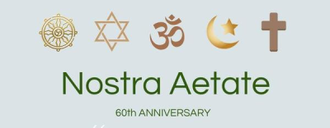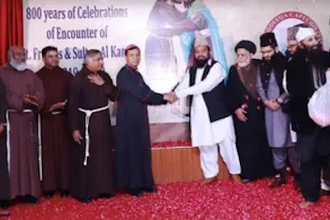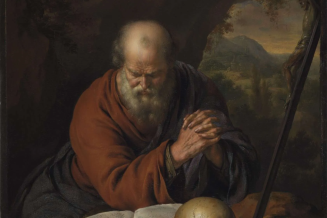Nostra Aetate and the Holy Spirit

Source: Jesuit Institute, South Africa
Fr David M Neuhaus SJ writes: When good Pope John XXIII was thinking about the "aggiornamento" of the Church at the end of the 1950s and the convening of a council, the Church's attitude towards other religions was not on the agenda. However, in June 1960, the Jewish French historian Jules Isaac visited him and raised the issue of the Catholic teaching of contempt for Jews and Judaism through the ages. Pope John, as Cardinal Roncalli, had witnessed at first hand the Shoah and had been active in getting Jews out of the clutches of the Nazis. He was responsive to Isaac's plea that Catholics be taught to respect rather than despise. In the wake of that meeting, Pope John mobilised the German Jesuit biblical scholar, Augustin Bea, who already headed the Secretariat for Christian Unity, promoting relations with non-Catholics, and asked him to compose a "Jewish document". This was the first movement of the Holy Spirit, putting relations with the Jewish people on the council's agenda.
The "Jewish document" would become paragraph 4 of Nostra Aetate. However, the rumours of European and North American churchmen formulating a teaching of respect for Jews prompted others to suggest widening the perspective. Among these were the Middle East bishops, and most prominently the Syrian-born Greek Catholic Patriarch Maximos IV Sayegh. He warned that dialogue with the Jewish people, a good thing, would be exploited by a state claiming to be Jewish, Israel, which was at war with the Arabs. Furthermore, many Christian and Muslim Palestinians had become refugees when Israel was established, and the ethnocentric character of the new state threatened the rights of those who remained. Sayegh also elaborated on the need for dialogue with the Muslim world. The Egyptian Dominican Georges Anawati and the White Fathers, as well as others, began to formulate a paragraph expressing "esteem" for Muslims, paragraph 3 of Nostra Aetate. This too was a movement of the Holy Spirit.
When John XXIII died in 1963, the new Pope Paul VI continued his work, promoting the concept of "dialogue". In his 1964 encyclical Ecclesiam Suam, he proposed a dialogue of respect that encompassed all of humanity, dedicating special attention to those of other faiths. "(W)e see another circle around us. This too is vast in extent, yet not so far away from us. It comprises, first of all, those who worship the one supreme God, whom we also worship. We would mention first the Jewish people, who still retain the religion of the Old Testament, and who are indeed worthy of our respect and love. Then we have those worshipers who adhere to other monotheistic systems of religion, especially the Muslim religion. We do well to admire these people for all that is good and true in their worship of God. And finally, we have the followers of the great Afro-Asiatic religions" (n. 107). The Holy Spirit was continuing to work.
The mutual respect between Bea and Maximos was one important element that transformed Catholic discourse about both Jews and Muslims, as well as members of other faiths, urging respect rather than contempt and condemnation. Bea himself bore witness to this in a book he published shortly after the Council. Addressing the Council Fathers, particularly Maximos and his Middle Eastern brothers, Bea wrote, "This Declaration might well be compared to the biblical grain of mustard seed. Originally, it was my intention to make a short and simple statement on the relation between the Church and the Jewish people. But, in the course of time, and particularly in the course of the discussions in this Assembly, this seed, thanks to you, has almost grown into a tree, in which all the birds of the air are nesting. In a sense, all the non-Christian religions find a place in it just as the present Pope included all non-Christians in his Encyclical Letter Ecclesiam Suam" (The Church and the Jewish People, 166).
In a world in which teachings of contempt are rearing their ugly heads again, the document Nostra Aetate, published exactly sixty years ago, should be compulsory reading. It was a beginning point, learning to speak of the religious other with respect. Over the following decades, Catholics have been invited not only to speak about the other, but to engage in dialogue with them, build friendships and work together to mend a broken world.
LINKS
London: Event marking 60 Years of Nostra Aetate: www.indcatholicnews.com/news/53514
Jesuit Institute South Africa: www.jesuitinstitute.org.za/
Nostra Aetate: www.vatican.va/archive/hist_councils/ii_vatican_council/documents/vat-ii_decl_19651028_nostra-aetate_en.html
Ecclesiam Suam: www.vatican.va/content/paul-vi/en/encyclicals/documents/hf_p-vi_enc_06081964_ecclesiam.html
Follow The Jesuit Institute on Twitter @JesuitInstitute


















